
Struggling to breathe? That’s a feeling no one wants to experience. Unfortunately, for over 262 million people across the world, conditions like asthma can quite literally “take your breath away.”
But beyond inhalers and mediations, is there anything you can do to reduce asthma attacks – or even stop them from occurring altogether?
Asthma is a complex condition, but with the help of holistic solutions like Traditional Chinese Medicine (TCM) and Chinese herbs for asthma, we can improve overall respiratory health for easier breathing and fewer attacks.
Let’s find out how…
What is Asthma?
Before we explore the ways to reduce or prevent asthma, we first need to unpack what asthma is – and is not.
Asthma is a chronic inflammatory disease of the airways that can lead to spasms of the bronchioles and blocked airways. If you think of your airways as tiny tunnels for air, asthma causes these tunnels to get inflamed and narrowed, making it hard for air to flow through easily. This inflammation leads to recurring periods of wheezing (a whistling sound when you breathe), chest tightness, shortness of breath, and coughing, particularly at night or early in the morning.
Asthma is not a contagious disease; you can’t catch it from someone else. It’s also not a type of allergy or random condition that pops up once in a while. It’s a chronic, long-term disease that requires ongoing management to keep under control.
That said, asthma is a highly manageable condition when you take the right approach. Many people with asthma lead full, active lives, but this requires a good understanding of your specific triggers and the best ways to avoid or mitigate them.
What Causes Asthma?
From your genetics to your environment, there are several different factors that can lead to asthma. While each person with asthma has different triggers and responses, these are the most common:
- Allergens: Things like pollen, dust mites, and pet dander can set off allergic reactions.
- Respiratory Infections: Common colds or other infections can trigger asthma symptoms.
- Physical Activity: Exercise can trigger asthma, especially vigorous exercise.
- Cold Air: Breathing in chilly air can be a trigger.
- Air Pollutants: Smoke (or smoking cigarettes), fumes, and other pollutants can aggravate asthma.
- Stress: Emotional stress often plays a role and can trigger an asthma attack.
- Obesity: Excess weight can put additional pressure on the lungs and airways, making it harder to breathe and increasing the risk of asthma.
Types of Asthma
Not all asthma is the same. There are different types with different triggers (and different treatments, too):
- Allergic Asthma
This type is triggered by allergens like pollen, dust mites, and pet dander, causing the immune system to overreact and inflame the airways. - Non-Allergic Asthma
Non-allergic asthma is induced by factors such as stress, exercise, cold air, smoke, and respiratory infections. - Occupational Asthma
This type is caused by exposure to irritants at the workplace – think chemicals, dust, or fumes. When exposed to these regularly over a long time, your body becomes reactive toward these triggers which can cause asthma. - Exercise-Induced Bronchoconstriction (EIB)
This type is triggered by physical exertion which makes your airways tighten up. It’s especially common in cold, dry air.
Conventional Treatments for Asthma
Your typical Western medicine doctor will likely focus on managing asthma by targeting the symptoms and opening the airways. This approach aims to provide immediate relief from asthma attacks and control chronic symptoms through medications that relax the airway muscles, reduce inflammation, and modulate the immune response. And, it’s usually pretty effective for in-the-moment relief.
- Bronchodilators (inhalers)
Quick-relief inhalers like albuterol help relax the muscles around your airways, making it easier to breathe during an asthma attack.
- Corticosteroids
These anti-inflammatory drugs reduce airway inflammation. This helps keep asthma attacks under control for longer periods of time, but they can have side effects with long-term use.
- Leukotriene Modifiers
These are oral medications that block inflammatory chemicals in the immune system to help prevent asthma symptoms.
- Biologics
For severe asthma, injectable biologic drugs can target specific aspects of the immune system that aren’t managed well by other medications.
While these treatments can be helpful to manage the symptoms of asthma, they do not typically address the underlying causes or the overall balance of the body’s systems. These solutions are necessary tools to keep in your toolbox for when an asthma flare-up occurs, but there are better ways to improve your overall respiratory health and help prevent future attacks: Traditional Chinese Medicine.
TCM and Asthma: A Holistic Perspective
Traditional Chinese Medicine (TCM) approaches asthma slightly differently than conventional Western medicine. Like Western therapies, TCM therapies can help calm the symptoms of asthma – like wheezing and cough. But it also goes a step further to restore healthy energy (Qi) flow through the respiratory system to improve overall lung function.
The Lung-Asthma Connection in TCM
Asthma, or “Xiao Chuan” (wheezing and dyspnea), is seen as an imbalance in the Lung system, as well as other organs, such as the Spleen and Kidneys.
- The Lung System and Asthma
According to TCM, the Lungs are in charge of Qi and respiration (breathing). Any disruption in this Lung function can lead to respiratory issues like asthma. One of the main disruptions is Lung Qi deficiency – this occurs when the Lungs don’t have enough vital energy to pull in air and distribute Qi throughout the body. - The Spleen System and Asthma
The Spleen’s function in transforming and transporting fluids prevents the accumulation of phlegm. What does this have to do with breathing? Phlegm is a common cause of asthma in TCM; this sticky substance blocks the airways and prevents us from breathing well. When the Spleen is weak, it can’t process fluids properly and they stagnate and turn to phlegm (which eventually collects in the Lungs). - The Kidney System and Asthma
The Kidneys may seem entirely unrelated to breathing, but in TCM, they have a close tie to the Lung system. They support respiratory function by grasping Qi and ensuring it descends into the Lungs to be distributed to the rest of the body. Strong kidneys help maintain the balance needed for proper lung function. - Qi and Blood Stagnation and Asthma
Emotional stress or trauma can cause Qi and blood stagnation, which leads to issues like chest tightness and breathlessness. When the flow of Qi and blood gets stuck, it can cause obstructions in the chest and exacerbate asthma symptoms.
Chinese Herbs for Asthma
Chinese herbal medicine has a long history of treating respiratory conditions, including asthma. These herbs aim to restore balance, strengthen the body’s defenses, and alleviate symptoms by targeting the underlying causes. Instead of just masking symptoms, TCM herbs work to fortify the body’s systems to prevent and reduce the severity of asthma attacks.
But which Chinese herbal formula is right for you? It’s best to consult a practitioner to help you decide which formula best suits your specific needs. The formulas below are some of the most common choices to help people relieve their symptoms and prevent future flare-ups:
- Ping Chuan Tang (Liquid Extract)
Ping Chuan Tang is a go-to extract for clearing out sticky, yellow phlegm and calming down heat-related asthma symptoms. If your asthma comes with a lot of thick mucus and a feeling of heat or feverishness, this formula helps cool things down and clear out the phlegm to make breathing easier.
- Bu Fei Wan
Bu Fei Wan is a tonic for your lungs. It strengthens your lung Qi and helps make your lungs more resilient over time. If you have chronic asthma and a chronic cough, this formula can help improve your lung function and make those symptoms less frequent. It can also help you clear out old mucus that is hard to get rid of.
- Bai Xing Shi Gan Teapills
For asthma attacks that are triggered by colds, flu, or fever, Bai Xing Shi Gan can help. It is a cold formula that balances excess heat, so is especially useful for relieving wheezing that comes with cough, fever, inflammation (such as tracheitis or a respiratory infection).
- Xiao Qing Long Tang (Liquid Extract)
When you’re having a cold, phlegm-heavy asthma day, this liquid tincture can help. Xiao Qing Long Tang helps “warm up” the lungs so it’s easier to breathe in cold weather and you can stop wheezing and coughing.
-
Sale!
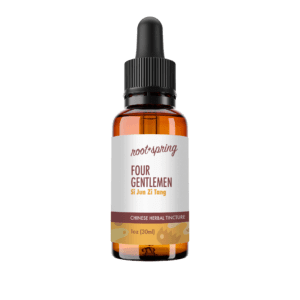 Si Jun Zi Tang (Four Gentlemen) – Liquid Extract (Tincture)
Starting at $14.00
Add to CartSelect options
This product has multiple variants. The options may be chosen on the product page
Si Jun Zi Tang (Four Gentlemen) – Liquid Extract (Tincture)
Starting at $14.00
Add to CartSelect options
This product has multiple variants. The options may be chosen on the product page
- Liu Jun Zi Tang (Liquid Tincture)
Where most formulas focus on the Lungs, Liu Jun Zi Tang is a tonic for the Spleen. It strengthens your digestion and helps your body manage fluids better, which is great for reducing phlegm buildup. If you have asthma with a lot of phlegm and feel generally sluggish, this formula can ease your breathing and give your digestion a boost.
-
Sale!
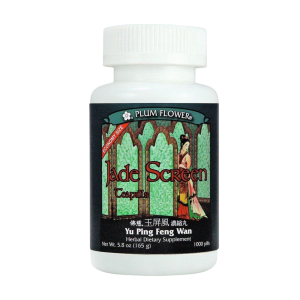 Plum Flower – Jade Screen Teapills (Yu Ping Feng Wan)
Starting at $23.13
Add to CartSelect options
This product has multiple variants. The options may be chosen on the product page
Plum Flower – Jade Screen Teapills (Yu Ping Feng Wan)
Starting at $23.13
Add to CartSelect options
This product has multiple variants. The options may be chosen on the product page
- Yu Ping Feng Wan
This formula is one of the most common preventative formulas for asthma, wheezing, cough, and general colds. Take it during the change of seasons to help strengthen your defenses, making you less likely to catch colds and trigger asthma attacks. If you find yourself getting sick often and it leads to asthma flare-ups, this formula can help build up your immune system so you stay healthier and breathe easier.
Breathe Easy with Chinese Herbs for Asthma
Tired of wheezing and coughing? Chinese herbs help you catch your breath.
By addressing the root causes and restoring balance within the body, these formulas can provide effective, natural relief all while improving your overall respiratory health. You can use them alone for mild symptoms (if recommended by your practitioner), or add them to your existing asthma care plan for more well-rounded support.
Ready to breathe easy? Shop now for these and other Chinese herbs for asthma, allergies, and respiratory health!


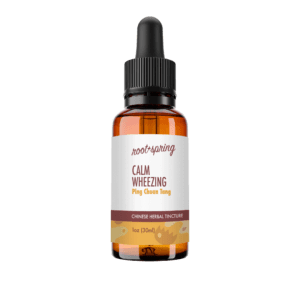 Ping Chuan Tang (Calm Wheezing) – Liquid Extract (Tincture)
Ping Chuan Tang (Calm Wheezing) – Liquid Extract (Tincture)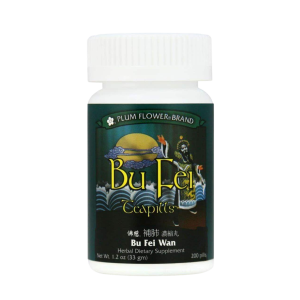 Plum Flower – Bu Fei (Bu Fei Wan)
Plum Flower – Bu Fei (Bu Fei Wan)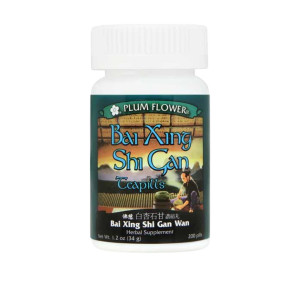 Plum Flower – Bai Xing Shi Gan
Plum Flower – Bai Xing Shi Gan
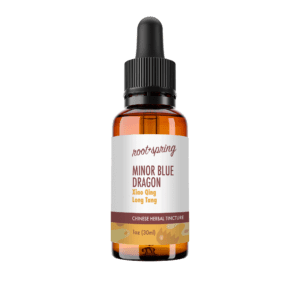 Xiao Qing Long Tang (Minor Blue Dragon) – Liquid Extract (Tincture)
Xiao Qing Long Tang (Minor Blue Dragon) – Liquid Extract (Tincture)